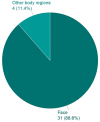Factors Influencing Litigation Compensation in Plastic Surgery: A Retrospective Analysis in China
- PMID: 40771261
- PMCID: PMC12327575
- DOI: 10.1097/GOX.0000000000007034
Factors Influencing Litigation Compensation in Plastic Surgery: A Retrospective Analysis in China
Abstract
Background: Doctor-patient disputes have become a prominent problem in contemporary society. The analysis and discussion of the factors leading to litigation compensation are essential to prevent and resolve doctor-patient conflicts, reduce litigation events, and provide better service for patients.
Methods: We reviewed the medical lawsuit cases of a plastic surgery hospital over the past 8 years. After excluding 11 withdrawal cases, we analyzed the types of surgery, surgical sites, and causes of litigation compensation in the remaining 36 cases. Subsequently, we proposed preventive measures to avert similar occurrences.
Results: Thirty six medical malpractice lawsuits were filed, 23 of which involved cosmetic surgery. In 72.2% (26 of 36) of the cases, disputes were resolved through compensation, with the majority involving facial plastic surgery, including procedures on the skin, eyes, nose, forehead, ears, and jaw. The primary reasons for pursuing legal action included dissatisfaction with surgical outcomes, postoperative complications or disabilities, lack of informed consent, inadequate doctor-patient communication, and insufficient preoperative examination records. Additional factors included improper medical documentation, deviation from established medical protocols, noncompliance with surgical indications, and insufficient attention to patient needs. Furthermore, 1 lawsuit was filed due to an incident in which a patient's family member fell on hospital stairs.
Conclusions: Plastic surgery often leads to lawsuits because patients are not satisfied with the cosmetic results. In reconstructive surgery, the causes of litigation are mainly postoperative complications, mainly infections. Doctor-patient communication remains the most important issue, especially effective and active communication.
Copyright © 2025 The Authors. Published by Wolters Kluwer Health, Inc. on behalf of The American Society of Plastic Surgeons.
Conflict of interest statement
The authors have no financial interest to declare in relation to the content of this article.
Figures
Similar articles
-
Analysis of the causes of improper medical decision-making in medical damage liability disputes in China: a text mining approach.BMC Health Serv Res. 2025 Aug 20;25(1):1112. doi: 10.1186/s12913-025-13177-8. BMC Health Serv Res. 2025. PMID: 40836339 Free PMC article.
-
Sexual Harassment and Prevention Training.2024 Mar 29. In: StatPearls [Internet]. Treasure Island (FL): StatPearls Publishing; 2025 Jan–. 2024 Mar 29. In: StatPearls [Internet]. Treasure Island (FL): StatPearls Publishing; 2025 Jan–. PMID: 36508513 Free Books & Documents.
-
Antidepressants for pain management in adults with chronic pain: a network meta-analysis.Health Technol Assess. 2024 Oct;28(62):1-155. doi: 10.3310/MKRT2948. Health Technol Assess. 2024. PMID: 39367772 Free PMC article.
-
Drugs for preventing postoperative nausea and vomiting in adults after general anaesthesia: a network meta-analysis.Cochrane Database Syst Rev. 2020 Oct 19;10(10):CD012859. doi: 10.1002/14651858.CD012859.pub2. Cochrane Database Syst Rev. 2020. PMID: 33075160 Free PMC article.
-
Litigation in Craniofacial Surgery in the US: An Analysis of Lawsuits Over 4 Decades.J Craniofac Surg. 2025 Jul-Aug 01;36(5):1570-1574. doi: 10.1097/SCS.0000000000011216. Epub 2025 May 20. J Craniofac Surg. 2025. PMID: 40392069
References
-
- Grandizio LC, Barreto Rocha DF, Hayes D, et al. An analysis of formal patient complaints, risk, and malpractice events involving orthopedic trauma surgeons during a 10-year period. Orthopedics 2023;46:121–127. - PubMed
-
- Bismark MM, Gogos AJ, McCombe D, et al. Legal disputes over informed consent for cosmetic procedures: a descriptive study of negligence claims and complaints in Australia. J Plast Reconstr Aesthet Surg 2012;65:1506–1512. - PubMed
LinkOut - more resources
Full Text Sources
Miscellaneous



